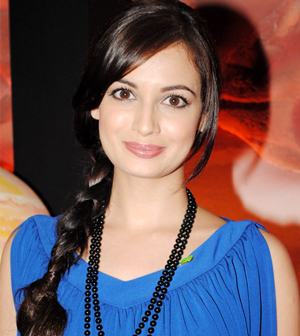 We have loved her work as an actress, but now Dia Mirza has taken on a new avatar. With Born Free Entertainment, Ms. Mirza, along with fiancé Sahil Sangha, started a production company to make the films and tell the stories they felt needed to be told. Their first production was the modern rom-com Love Breakups Zindagi. For their next film, they took on something that has not been seen in Indian cinema before… a female private investigator. Starring Vidya Balan, Bobby Jasoos, which hits theaters on Friday, tells the story of a girl who has a rather unusual dream to be the number one detective in the old city area of Hyderabad.
We have loved her work as an actress, but now Dia Mirza has taken on a new avatar. With Born Free Entertainment, Ms. Mirza, along with fiancé Sahil Sangha, started a production company to make the films and tell the stories they felt needed to be told. Their first production was the modern rom-com Love Breakups Zindagi. For their next film, they took on something that has not been seen in Indian cinema before… a female private investigator. Starring Vidya Balan, Bobby Jasoos, which hits theaters on Friday, tells the story of a girl who has a rather unusual dream to be the number one detective in the old city area of Hyderabad.
We got the fabulous chance to chat with Dia about all things Bobby Jasoos and her passion for the project came through in every line. Full of laughter and wonderful answers, Dia gave us the producer’s insight on what she thinks makes Bobby Jasoos so special. Check it out!
What made you start Born Free and produce films?
Our love for cinema. Our desire to be able to tell the kind of stories that we believe need to be told. A collective aspiration of the kind of storytelling that we would like to explore and we believe people should be exposed to.
What was it about Bobby Jasoos that made you want to make it into a film?
In the India context, it was a very unique thought. It was a thought that instantly drew us in. The thought of a young girl, living in the by lanes of an old city, in Hyderabad, who belonged to a Muslim family, who has this dream to be a private detective. You know, it’s not a very extraordinary ambition but it’s a very unlikely aspiration for a young woman in that part of the world and how she perseveres and believes and wants to do it and the fun she has along the way.
 That was really interesting because we were talking to a lot of real private detectives who seem to have pretty flourishing business in a certain economic strata of India and they are usually employed by people having relationship problems or are having domestic issues. So it’s not deep, dark, gore, it’s not stuff that somebody has been murdered and go find out who… the police do that and our government detective agencies do that. But we are talking about private detectives here who have a bit of a bumbling, awkward way of functioning. They are not very refined and it’s not something that they are trained to do. A lot of people take this up because it is just an interesting job to do and they get paid to do it. If they have an eye for detail and then they figure out how to work their way around, they manage to do pretty well. The exploration of that and the thought of that in this world and the dynamics of it and how it affects a woman’s life in the context of the film. Does she become what she believes she is? Does she find that big case that is going to change her life? How does that impact her personally and how does her family dynamic respond and react to that situation? I think all of that, collectively, was a very, very engaging and interesting space to explore.
That was really interesting because we were talking to a lot of real private detectives who seem to have pretty flourishing business in a certain economic strata of India and they are usually employed by people having relationship problems or are having domestic issues. So it’s not deep, dark, gore, it’s not stuff that somebody has been murdered and go find out who… the police do that and our government detective agencies do that. But we are talking about private detectives here who have a bit of a bumbling, awkward way of functioning. They are not very refined and it’s not something that they are trained to do. A lot of people take this up because it is just an interesting job to do and they get paid to do it. If they have an eye for detail and then they figure out how to work their way around, they manage to do pretty well. The exploration of that and the thought of that in this world and the dynamics of it and how it affects a woman’s life in the context of the film. Does she become what she believes she is? Does she find that big case that is going to change her life? How does that impact her personally and how does her family dynamic respond and react to that situation? I think all of that, collectively, was a very, very engaging and interesting space to explore.
I am very happy that we did because I think we don’t tell enough stories about our women and when we do, they are usually very dark. They are always about proving a point – the emergence of a character who has endured and suffered, or who has been through this huge problem and this rise of the hero. What I liked about this film is it’s socially relevant because in many ways it’s just a reflection of how that part of society responds and reacts to women. But alongside that, what makes it interesting, is that it’s such a fun ride. It’s so high in energy and life, color and effervescence. It’s not depressive and it’s not dark and it’s not gloomy. It’s just happy.
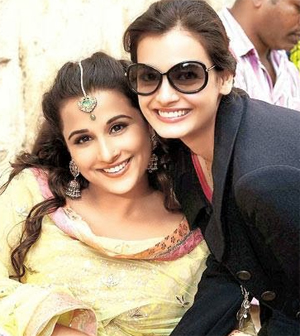 Did you have Vidya Balan in mind for the role?
Did you have Vidya Balan in mind for the role?
Stacey, what happens usually is and I know a lot of Indian films are made like that, where people have a one thought, one idea, then they go meet and actor. If the actor is excited about the idea then the script gets written. We follow a slight different norm. We believe in investing in a story first. I think fundamentally as a company we need to be completely enthused by what we’ve written and believe that this is the story that must be told. After the story is written, we budget the film and then determine who should be in it, because it is important to have an actor who is apt to play the part. It is also important that that actor is as far reaching as possible, that it’s a talent that will excite the audience to come into the theatre. Especially for female-centric films. I actually hate using those words ‘female-centric’ because I think that a story is a story and the dominating part could be a man or a woman. We really shouldn’t be dividing our film experience into a male centric film or a female centric film but I think, again in the India context, we don’t have very many female actors who have commanded a huge box office revenue in films that are dominated by the female part. It becomes a very tricky decision to make. Sahil [Sangha] came up with Vidya’s name when we were looking for who to cast and all of us jumped at it.
I’ve known Vidya now for many years, I acted with her in her first film Parineeta and we did Lage Raho Munnabhai together and we’ve always had a very warm and a very cordial equation. I’ve really, really always respected and admired her ability to just be unconventional in her choices and do what she believed in and never allow the dictates of the industry or the stereotype perception of how women in the industry should be to determine her path. I was like she will be fantastic for this, let’s go meet her. I knew when we went with the film to her there is no way she could deny what Bobby Jasoos is and could be. And I was right she loved it. (Laughs)
When I heard who was going to play the role I was like yes, she would be perfect!
She’s actually also a lot like Bobby.
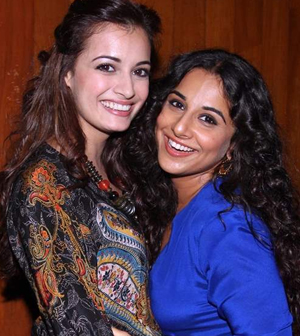 Is she?
Is she?
Yeah she is. Bobby is unconventional but she’s not irreverent. She doesn’t follow the beaten path, but at the same time she is not rebellious. And that’s what I feel Vidya is. She’s not followed any kind of a system or a mould, she’s kind of made her own, and she’s free. She’s not limited by perceptions and by what people believe the way things should be done. At the same time she does not rebel. She’s very contained and happy and at the same time she is very free. So I think that is what is so close about these two people – the character in the film and her as an individual.
Did she surprise you in anyway in playing this role?
She did! It’s a very effervescent part and she’s a very lively person, personally as well. I’ve always felt she never played a lively part on screen before. She’s always played very mature parts in the films. But what surprised me was how nimble-footed she was in the film. She was just flying around the place and I was like, ‘What happened to you? This is amazing. How is this happening?’ and she said, ‘Bobby makes me feel like this. I just feel really, really light’. That was amazing because I didn’t know whether she could be as agile as the part was written to be. I knew that she would be effervescent and lively, but I didn’t know she’d be so active. That was really amazing to see how active she was. She was just all over the place, which was great fun to see.
Then, of course, she had to take on the many different characters and the disguises.
You know, I think this is one of those films that gives the costume department such a great chance and opportunity to lend so much to the actor. And I have to say if we didn’t have Theia working with Vidya to do what they did and the efforts they put in in transforming her physically the way they have, I’m not sure whether she would have been as inspired as an actor as she did become once she got transformed. I really feel that there’s a great amount of contribution that must be acknowledged by the team working to transform her. But also, when she would see herself she would just become that person. She said that it was easy to become that person because they did such a magical job in physically changing her that suddenly her voice would change, her manner would change. The first day of shoot when she was doing the beggar disguise, we put her on street and we were shooting guerrilla style – nobody knew Vidya Balan was sitting on the streets amidst real beggars. They got a little territorial and I think they felt a little insecure and she said don’t worry I am not taking your money away and she started handing out the money that she was getting. She even got scolded by a lady who was passing by when Vidya grabbed her arm and begged her for money. The lady turned around and snapped at her saying, ‘Your arms and legs seem to be working fine… why are you begging?’ I was watching from a distance and cracking up, if only you knew that was Vidya Balan. It was quite magical because it was our first day, it was actually the first shot of the film and that gave us the sense that we were on to something special.
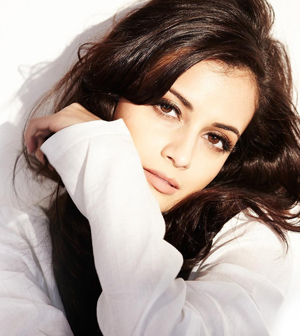 Tell us about casting Ali Faizal in the film.
Tell us about casting Ali Faizal in the film.
Every single character in this film is so important. They are all catalysts to her journey and they form such an important part of her world. Given how brilliant she is, it was very important to find actors who could hold their own and deliver in their respective parts. Shruti Mahajan, our casting director, I think auditioned close to 25 young actors for this part. We wanted somebody fresh and somebody new. We knew we were looking for somebody who had the combination of intelligence and depth and had a more statuesque manner. Tasawur, Ali’s character in the film, even though he belongs to the old world Hyderabad, his aspiration is to leap out of that place, to get out of there. He is a little more well educated. His manner is a little more evolved than the people around him. We were looking for somebody that…well there is an Urdu world called tehzeeb, which means culture, somebody who is very cultured. There were a lot of very interesting actors who auditioned for us, but there was something very, very honest and pure about Ali that caught our attention. He surprises you. His performance is not what you expect. He always does something that engages you and draws you in instantly. He is a charmer – he really is. And his eyes! They are extremely expressive. He is very confident. He has only done three films, he was in 3 Idiots and then he did a film called Fukrey and I think he did one other film. In all of them he managed to make an impression but because he did not have much to do he didn’t connect with the audiences the way I hope he will with this film because he has so much more to do in this one. He just called out to us through his audition. It was just very, very clear that this part belonged to him
We have to talk about the wonderful music. I love ‘Tu’ that is probably one of my favorite songs. It is beautiful.
Yes, that is everyone’s favorite. I cried! I mean I bawled the day I heard the composition. I had goose bumps and I had tears rolling down my eyes. It had no lyrics… nothing, it was just the scratch tune that Shantanu Moitra made us hear. It just moved me. It was so transporting and so melodious.
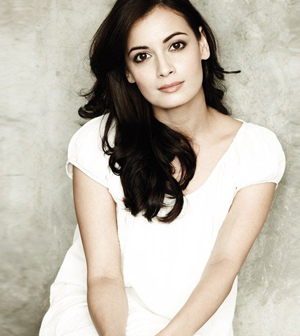 So what kind of brief and what kind of music did you want for this film?
So what kind of brief and what kind of music did you want for this film?
I think casting the technicians on this film was very, very, very, very critical. We needed to bring a certain esthetic and sensibility together that we believed would reflect in the film. Shantanu Moitra and Swanand Kirkire are two people who Vidya and I have a connection with; we did Parineeta and Lage Raho together. I have always admired Shantanu’s depth, he’s not your commercial, regular music composer. He is not somebody who subscribes to a certain mandate that I am sure a lot of music composers in our country are forced to do. He has always had his own mind and interpretation. He has always composed songs for the film. They have always reflected the core and the essence of the film beautifully. When we finished writing Bobby Jasoos, the first name that came to my mind was Shantanu Moitra. I am just really glad he chose to work with us and he chose this film because I know that his contribution and his insight, his experience and his depth, his personal depth as a human being, will contribute significantly overall to the experience of this film. And I am just not talking about the music album, I am also talking about the background score because he has also composed the score for the film.
I would say the same for Swanand Kirkire. Both are extraordinary human beings, have extraordinary gravitas and they understand India, the fabric, the core, the grassroots level of India, really well and this film needed a very rooted sensibility so it worked out well.
You shot the film in Hyderabad…
Yes. It actually is the city of my birth. The reason we set the film there was because I insisted we take the story to Hyderabad because I felt the flavor would become unique. I am really glad I kind of bulldozed that (laughs) because that is what people are seemingly responding to. It is quite exciting!
You know, when we were filming ‘Tu’ at the Golconda Fort, I was just looking around and I thought to myself, ‘My God! You know, all these years that I have come here as a child. I have picnicked with my parents. I have walked these walls and I never knew that one day I would come back and I would be making a movie and we would be filming a song here’. It was quite incredible.
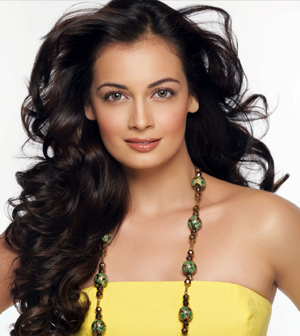 This film really is a gift to my Dad. I wish he was alive to see it. He would have been very proud to see how we have woven in our roots, my childhood experiences, my impressions of the city and my love for it into this film.
This film really is a gift to my Dad. I wish he was alive to see it. He would have been very proud to see how we have woven in our roots, my childhood experiences, my impressions of the city and my love for it into this film.
What do you love about the film?
The story, the journey of this character. I think she is absolutely loveable. She is adorable (laughs) and she is real, she is so real. She’s layered and she’s complicated and yet she is so simple. She is like what most women are. (Laughs) You could be from any part of the world and you would identify with her.
What would you say is the hardest thing about being a producer and what do you love?
The best thing is making it happen. Making it all happen. Putting it all together. Watching it come alive. Beginning as written word on paper and metamorphosing into reality and becoming tangible. It becoming a tangible experience is really incredible.
The worst thing would be just that you have to deal with people all the time. And it is all kinds of people. I think the worst thing is just dealing with egos.
Otherwise, it is just an extraordinary experience. It is just so gratifying. It is so beautiful. I think ultimately it’s a reflection of what you believe in and the faith that you have in bringing people together and choosing those people and believing in each of them. You feel like a parent, you know, watching your children perform and grow and do things. It is just lovely. (You can hear her smile)
Are you happy with the final product?
Yes, yes I am. I’m very satisfied. I am proud of it.
Is your next big production your wedding?
It has been the most neglected production but hopefully we will squeeze it before our next film. Yes, it should happen. We will get into that one once this one releases.
What we will see you in as an actress next?
I don’t know. You know I haven’t really thought about that yet. I have just been so consumed with making this one. I have really enjoyed it. I would say that I have never been happier. I think when you are an actor you are such a smaller part of a bigger exercise and making films you just have so much more to do and it is much more creatively satisfying. I am not sure, unless I get something unbelievable, I don’t know whether I would be able to trade what I can do here in making films and exchange it for what I can do with acting in one.
What do you hope fans will love about Bobby Jasoos?
Its simplicity, its honesty and its life. It is a very, very alive film.









